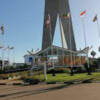
The Sunday News

ZIMBABWEAN authorities remain at risk of being caught flat-footed by natural disasters because of the country’s weak disaster preparedness, with present disaster management systems more biased towards responding to, rather than preventing mishaps, experts have said.
The country has recurrently been hit by natural disasters with floods and droughts headlining the list of mishaps, and authorities have on most occasions been caught off-guard, only moving in to rescue situations often a little late.
Recent disasters in other parts of the world have prompted experts in the area of disaster management to implore Government to be proactive and come up with preventive measures that mitigate the impact of disasters on livelihoods of people.
Papua New Guinea was on Friday last week struck off by a 7.1 magnitude earthquake just a day after a 6.7 magnitude tremor was experienced in the region. According to the US Geological Survey, the quake hit at a depth of 53 kilometres and 110km south-southwest of Kokopo, in the province of New Britain, at around 8am GMT.
This comes hot on the heels of the devastating 7.8 magnitude earthquake in Nepal that killed more than 6 000 people, according to latest updates, though fears abound that the death toll could exceed 10 000.
At the beginning of this year thousands of people were displaced while several others were reported dead when floods hit the central and northern parts of the country.
In 2014 and previous years over 400 families were affected by floods that hit Tsholotsho District in Matabeleland North Province while more than 3 000 families in Masvingo Province were displaced by floods when torrential rains caused water levels in the partially constructed Tokwe-Murkosi Dam catchment area to reach high levels causing partial breach of the dam wall.
The two mishaps came as a rude awakening to authorities in the country and exposed the country’s lack of capacity to efficaciously deal with disasters of such magnitudes.
Most parts of the country, particularly in the southern region are facing serious food shortages owing to erratic rains during the 2014-2015 summer cropping season, which led to poor yields.
Despite assurances by Government that no one would starve as efforts were in motion to procure grain, analysts feel Government could do better in enhancing food security in the country in the face of manifestation of climate change effects.
While the Civil Protection Unit (CPU) says the previous disaster experiences had made the country wiser in terms of dealing with disasters, experts believe more needs to be done to prepare for disasters and lessen their impact.
A technical scientist specialising in infrastructure development, Dr Gatsha Mazithulela, said most of the disasters experienced in Zimbabwe could have been averted by proper planning, adding that the present disaster management model left the country vulnerable to catastrophes.
Dr Mazithulela pointed out the Tsholotsho floods whose effects he said could have been averted by construction of waterways that direct water away from where people are settled.
“Preparedness and responsiveness are separate parts of disaster management. As a country we seem to be inclined to responsiveness rather than preparedness. We always respond to disasters which in the first place could have been avoided by careful planning. We need to be proactive and prepare for disasters most of which we would have predicted in the first place.
“For areas that are traditionally known to be prone to floods, there is a need to put in place drainage structures linked to physical planning for settlement. We can’t wait for disasters to occur every year and then put in place reactionary measures. Construction of waterways that divert the water away from where people are settled is a better way to prepare for floods,” he said.
On droughts, Dr Mazithulela said that provision of food aid was reactionary and showed lack of preparedness, urging Government to embark on robust resuscitation of irrigation schemes as well as construction of new ones as a lasting solution to food shortages in the country.
Dr Mazithulela’s sentiments on the country’s lack of disaster preparedness were backed by Zimbabwe Red Cross Society secretary-general Mr Maxwell Phiri, who attributed the challenge to a lack of resources.
“To a considerable extent the country is found wanting when it comes to disaster preparedness. Yes we have enough personnel on the ground, who are well trained to deal with disasters but we are always challenged when it comes to resources.
“Year in year out we are hit by floods and we have a profile of the disaster which should allow us to be better prepared. There is a need for us to come up with a deliberate and collective budget that allows us to be more prepared, proactive and less reactive,” he said.
Mr Phiri said communities also had a role to play in disaster preparedness urging members of the public to appreciate information on impending catastrophes and act as advised by authorities to reduce risks.
Another analyst, Mr Guidance Mthwazi, of the Institute of Development Studies at the National University of Science and Technology (Nust) noted an improvement in authorities’ response to disasters, a development he attributed to lessons learnt from previous experiences.
“I feel the Civil Protection Unit, fire departments in most cities and towns and other authorities are now wiser having learnt from previous encounters with disasters. There is an impressive awareness out there on issues to do with disasters and I feel as a country we are now better prepared than we were in previous years. Of course more needs to be done in terms of preventing disasters but generally we are more alert than before,” he said.
Bulawayo chief fire officer Mr Richard Peterson spoke on the preparedness of local authorities to deal with disasters such as fire outbreaks and road traffic accidents, noting that most councils in the country lacked capacity to deal with mishaps of such magnitudes.
He, however, pointed out that efforts were being made to capacitate local authorities to respond to disasters through training of personnel and procurement of equipment courtesy of Operation Florian, a United Kingdom-based organisation.
“At the moment we are not well prepared to deal with disasters. Why? Because most local authorities’ emergency service departments are under-capitalised. We can’t say we are prepared until such a time when we acquire necessary equipment and put in place proper emergency service structures.
“We have tried to assist some local authorities with training of their personnel, provision of equipment and setting up of fully fledged fire brigades. There are many incidents that serve as examples of our lack of preparedness as local authorities to deal with disasters,” said Mr Peterson.
Civil Protection Unit director Madzudzo Pawadyira said the country had put in place adequate systems to effectively deal with disasters but was short of funding to trigger the systems into motion in the event of mishaps.
“We have the capacity to deal with disasters of course within the prevailing economic environment. A system is there and we have plans on how to deal with disasters. We meet after every six weeks as a committee to share notes, update each other on possible disasters and come up with plans to respond.
“We have plans on how to deal with droughts, plans for climate change effects, earth tremors and so on. We have recommended that $3 million be allocated to disaster management every year to at least trigger the system into response mode, but the money is not there. That is our biggest challenge,” said Mr Pawadyira.
At least 19 people were killed and about 36 000 displaced, in Madagascar when three rivers that cross Antananarivo — the Sisaony, Ikopa and Imamba — burst their banks during a storm on 24 February, leading to massive floods.
According to the World Risk Report of 2013 inhabitants of sub-Saharan Africa are threatened by natural disasters.



